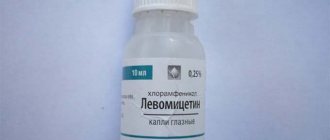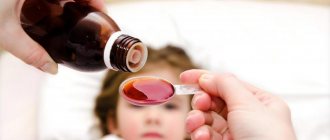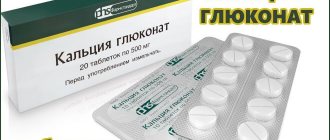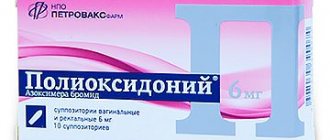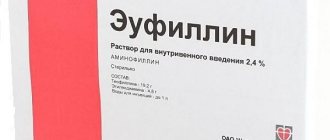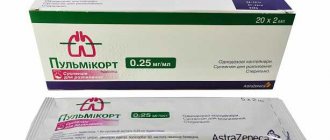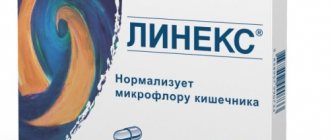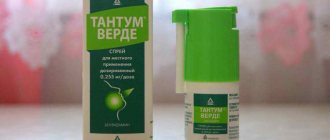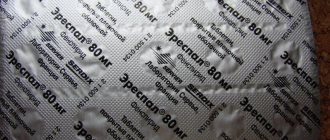Instructions for use Derinat method and dosage
Prescribed to adults intramuscularly (within 1-2 minutes).
The average single dose is 75 mg (5 ml). The interval between administrations is 1-3 days. Recommended doses for intramuscular injections for the following diseases:
- For ischemic heart disease - 5 ml every 48-72 hours. Course – 10 injections.
- For gastric and duodenal ulcers: 5 ml every 48 hours. Requires 5 injections.
- For cancer: 5 ml every 24-72 hours. The course of treatment is 10 injections.
- In gynecology (endometritis, chlamydia, ureaplasmosis, mycoplasmosis, salpingoophoritis, fibroids, endometriosis): 5 ml after 24-48 hours. Course – 10 injections.
- In andrology (prostatitis, benign prostatic hyperplasia) – 5 ml every 24-48 hours. The course of treatment is 10 injections.
- For tuberculosis: 5 ml every 1-2 days. 10-15 injections are performed.
- For acute inflammatory diseases: 5 ml every 1-2 days. The course of treatment is 3-5 injections.
- For chronic inflammatory diseases: 5 ml of solution, the first 5 injections are given with an interval of 1 day, the subsequent ones - with an interval of 2 days. The general course is 10 injections.
- When using a solution of 15 mg/ml, 2 ml intramuscular injections are given every day, recalculating, until the course dose of 375-750 mg is reached.
- The frequency of intramuscular injections in children is the same as in adults. The average single dose for children under 2 years of age is 7.5 mg (0.5 ml). For children from 2 to 10 years old, a single dose is calculated: 0.5 ml per 1 year of life. Children over 10 years of age are prescribed the drug in an average single dosage of 75 mg (5 ml). The course lasts up to 5 injections.
- Derinat in the form of a solution for external and local use is prescribed depending on the location of the pathological process.
- To prevent ARVI, instill 2 drops into each nasal passage 2-4 times a day. Course duration is 7-14 days. If symptoms of a respiratory disease appear, 2-3 drops are prescribed into each nasal passage every 60-90 minutes during the first 24 hours. Then instill 2-3 drops into each nasal passage 3-4 times a day. The course of therapy lasts from 5 to 30 days.
- For inflammation of the nasal cavity and paranasal sinuses, instill 3-5 drops into each nasal passage 4-6 times a day. The course lasts 7-15 days.
- In case of inflammation of the oral cavity, rinse with the solution 4-6 times a day is prescribed: 1 bottle is divided into 2-3 rinses. The course of therapy lasts 5-10 days.
- For chronic inflammation, fungal, bacterial and other infections in gynecological practice, tampons soaked in a solution are inserted intravaginally. They can irrigate the vagina and cervix with 5 ml per procedure 1-2 times a day for 10-14 days.
- For hemorrhoids, administer rectally using microenemas of 15-40 ml. The course of treatment is 4-10 days.
- In ophthalmology, for severe inflammation and dystrophic processes, 1-2 drops are instilled into the eyes 2-3 times a day. Duration of therapy is 14-45 days.
- For obliterating diseases of the legs, to achieve a systemic effect, instill 1-2 drops into each nasal passage 6 times a day. The duration of therapy is up to six months.
- For post-radiation necrosis of the skin and mucous membranes, for long-term non-healing wounds, burns, frostbite, trophic ulcers of various etiologies, gangrene, it is recommended to apply applications to the affected areas using a gauze bandage soaked in a solution. The procedure is carried out 3-4 times a day. You can treat the affected area with the drug from a nebulizer in a dose of 10-40 ml 4-5 times a day. The course of treatment lasts from 1 to 3 months.
Indications
As monotherapy:
- prevention and treatment of ARVI;
- acute respiratory infections;
- inflammatory and dystrophic eye diseases;
- inflammatory diseases of the oral mucosa.
As part of complex therapy:
- chronic inflammatory diseases,
- fungal,
- bacterial and other infections of the mucous membranes in gynecology;
- acute and chronic diseases of the upper respiratory tract (rhinitis,
- sinusitis / incl.
- frontitis,
- sinusitis/);
- obliterating diseases of the lower extremities;
- trophic ulcers;
- gangrene;
- infected and long-term non-healing wounds (incl.
- for diabetes mellitus);
- burns;
- frostbite;
- post-radiation necrosis of the skin and mucous membranes;
- haemorrhoids.
What kind of medicine is this
Derinat is an immunomodulator that contains sodium deoxyribonucleate. The medicine exhibits a stimulating effect on various parts of the immune system and causes an increase in the body’s nonspecific natural defenses. This activity manifests itself against bacterial, viral and fungal microorganisms.
In addition, it helps restore mucous membranes and tissues and has a pronounced regenerating effect in case of tissue damage.
The drug has anti-inflammatory properties, exhibits antioxidant and antitumor effects. Stabilizes cell wall membranes and exhibits weak anticoagulant properties. By removing free radicals from the body, it increases the resistance of cells to chemoradiotherapy.
This drug accumulates in the immune defense organs, as well as in foci of hematopoiesis and intestinal mucosa. It increases the body's resistance to various infectious diseases and stimulates the formation of new blood cells (hematopoiesis).
In patients with problems of the cardiovascular system, it is prescribed as an anti-ischemic and protective medication. It increases patients' tolerance to physical activity and has a beneficial effect on the functioning of the heart and blood vessels.
An important advantage of the medicine is that it has no effect on the fetus, which makes it possible to use it during pregnancy after consulting the treating doctor. It is also taken in a comprehensive treatment regimen for female and male infertility.
Use in pediatrics
Based on data obtained from various clinical and laboratory tests, it has been proven that Derinat has an extremely beneficial effect on growing children's bodies, so it can be used to treat and prevent colds in children.
It is ideal for strengthening the immune system in the treatment of bronchitis, pneumonia and sore throat. It is justified to add the drug to complex therapy for the treatment of myocarditis, inflammation of the kidneys and joints in children. For young children, Derinat can be added to inhalations when treating infections of the upper and lower respiratory tract, to relieve attacks of allergic rhinitis and sneezing, and to relieve and prevent attacks of bronchial asthma.
Children are more susceptible to allergic reactions, hypersensitivity and intolerance. Therefore, before using Derinat or any other new medicine, we recommend trying a small dose on the first day to monitor for a possible negative reaction.
For children, the medicine is prescribed only by a pediatrician.
Why is it recommended for children?
When children enter a group environment, they become infected with viral and bacterial infections several times a month, which must be treated with antibiotics and antiviral drugs. In turn, the internal organs and immunity of children suffer from them.
To protect the child, it is necessary to stimulate the immune system with the help, for example, of Derinat. It is convenient to use and is not contraindicated for children. Derinat is allowed for newborns and infants, although for the first 6 months of life the child is protected by innate immunity transmitted from the mother.
Indications and contraindications for use
A broad-spectrum drug as an independent medication is prescribed to patients for the following pathologies:
- acute respiratory infections;
- ARVI;
- ophthalmological diseases (dystrophic, purulent-inflammatory, inflammatory);
- inflammation of the mucous membrane of the nose and mouth.
Derinat can be combined with other medications for the following diseases:
- lesions of the mucous membranes and skin caused by radiation therapy;
- haemorrhoids;
- burns and frostbite;
- gangrene;
- trophic type ulcers in diabetes mellitus;
- obliterating diseases of the lower extremities;
- sinusitis, rhinitis and other chronic diseases of the upper respiratory tract;
- inflammatory pathologies of fungal or bacterial etiology.
Indications for use of intramuscular solution:
- pulmonary tuberculosis;
- endometritis;
- prostatitis;
- burn disease;
- diseases of the urogenital tract, the causative agents of which are ureaplasma, mycoplasma or chlamydia;
- rheumatoid arthritis;
- odontogenic sepsis;
- bedsores;
- duodenal ulcer;
- stomach ulcer;
- cardiac ischemia;
- myelodepression with impaired bone marrow circulation;
- radiation injuries.
Derinat is prescribed to patients during the rehabilitation period after surgery as an immunomodulator. The drug has virtually no contraindications, with the exception of hypersensitivity to the main component in the patient.
Nosological classification ICD-10
- A16 Respiratory tuberculosis, not confirmed bacteriologically or histologically
- A41.8 Other specified septicemia
- A49 Bacterial infection of unspecified localization
- A49.3 Mycoplasma infection, unspecified
- A49.8 Other bacterial infections of unspecified location
- A56 Other chlamydial sexually transmitted diseases
- A63.8 Other specified diseases predominantly sexually transmitted
- A64 Sexually transmitted diseases, unspecified
- B34.9 Viral infection, unspecified
- B99 Other infectious diseases
- B99.9 Other and unspecified infectious diseases
- D26 Other benign neoplasms of the uterus
- D64.9 Anemia, unspecified
- D84.8 Other specified immunodeficiency disorders
- I25.9 Chronic ischemic heart disease, unspecified
- I70.2 Atherosclerosis of the arteries of the extremities
- I73 Other peripheral vascular diseases
- I73.9 Peripheral vascular disease, unspecified
- I87.2 Venous insufficiency (chronic) (peripheral)
- J06 Acute upper respiratory tract infections of multiple and unspecified localization
- J22 Acute respiratory infection of the lower respiratory tract, unspecified
- J30 Vasomotor and allergic rhinitis
- J30.1 Allergic rhinitis caused by pollen
- J44 Other chronic obstructive pulmonary disease
- J44.9 Chronic obstructive pulmonary disease, unspecified
- J45 Asthma
- K12 Stomatitis and related lesions
- K25 Stomach ulcer
- K26 Duodenal ulcer
- K29.9 Gastroduodenitis, unspecified
- L20 Atopic dermatitis
- L98.4.2* Trophic skin ulcer
- M06.9 Rheumatoid arthritis, unspecified
- N39.0 Urinary tract infection without established location
- N40 Prostatic hyperplasia
- N41 Inflammatory diseases of the prostate gland
- N70 Salpingitis and oophoritis
- N71 Inflammatory diseases of the uterus, except the cervix
- N74.4 Inflammatory diseases of the female pelvic organs caused by chlamydia (A56.1)
- N80 Endometriosis
- R68.8.0* Inflammatory syndrome
- T14.1 Open wound of unspecified body area
- T30 Thermal and chemical burns of unspecified location
- T66 Unspecified radiation effects
- T78.4 Allergy, unspecified
- T79.3 Post-traumatic wound infection, not elsewhere classified
- Y84.2 Abnormal response or late complication in a patient without mention of accidental harm during a radiological procedure or radiation therapy
- Z100* CLASS XXII Surgical practice
- Z51.0 Radiotherapy course
- Z51.1 Chemotherapy for neoplasm
- Z58.4 Exposure to radiation pollution
- Z98.8 Other specified postsurgical conditions
pharmachologic effect
Immunomodulators are widely used in medicine because they are capable of improving cellular and humoral protective immune functions in a short period of time. They have a positive effect on the activity of B-lymphocytes and T-helpers, whose task is to recognize antigens and produce antibodies to infectious agents that have entered the human body.
After ingestion, the drug activates the nonspecific resistance of the human body. In response to this, the body's immune reaction follows, and changes occur in inflammatory processes caused by bacteria or viruses.
The active component of the drug is sodium derinate, which has increased lymphotropism. It is due to this substance that the detoxification process by the lymphatic system is significantly accelerated.
Another positive point is that this medicine can be given to patients with severely weakened immune systems caused by long-term chemotherapy or radiation treatment.
In addition to the above, the active substances have a positive effect on hematopoiesis, normalizing the number of blood cells by affecting phagocytes, platelets and lymphocytes.
With a runny nose
It is recommended to start using the drug as soon as the primary symptoms of a runny nose appear. The manufacturer's summary states that the medicine can stimulate the activity of the immune system against bacterial and viral agents. If the runny nose is of viral origin, Derinat should be used as monotherapy.
A bacterial runny nose differs from a viral runny nose in that the mucous membranes of the nose try to free themselves from microorganisms, which is accompanied by the release of large amounts of secretion. Bacteria in the nasal cavity are present in almost all people. However, the number of these bacteria does not exceed a certain limit. In such cases, we are talking about the opportunistic nature of microorganisms. Viruses, unlike bacteria, are always definitely pathogenic. When viruses enter the respiratory tract, they immediately penetrate the cellular structures of the mucous membranes, where their duplication begins. That is, when a runny nose appears suddenly, we can say that it is of a viral nature.
The main danger of viral damage is that viruses affect the immune system as suppressants. After the body's immune response is suppressed, the body's protective functions gradually decrease, as a result of which the bacteria living in the nasal cavity begin to transform from opportunistic to pathogenic.
In some cases, primary bacterial rhinitis may also occur. And protective functions can weaken not only under the influence of the virus, but also for a number of other reasons, including immunodeficiency states, hypothermia, and smoking.
In accordance with the instructions, Derinat nasal drops are also capable of providing a local immunostimulating effect for rhinitis caused by any pathogenic microbes. In case of bacterial rhinitis or late initiation of therapy, the use of this remedy alone will not be enough. In such cases, it is recommended to switch to complex therapy and supplement it with the use of antibacterial drugs.
What else can you learn from the instructions for Derinat for children and adults?
Pharmacokinetics
Suction and distribution
The drug is quickly absorbed and distributed in organs and tissues via the endolymphatic transport pathway. It has a high affinity for the organs of the hematopoietic system, takes an active part in cellular metabolism, integrating into cellular structures. During the phase of intensive entry of the drug into the blood, redistribution occurs between plasma and blood cells, in parallel with metabolism and excretion. After a single injection, all pharmacokinetic curves describing the change in drug concentration in the studied organs and tissues are characterized by a rapid phase of increase and a rapid phase of decrease in concentration in the time interval of 5–24 hours. The half-life (T ? ) for intramuscular administration is 72.3 hours. Derinat is quickly distributed throughout the body, during daily course use it accumulates in organs and tissues: maximum: – in the bone marrow, lymph nodes, spleen, thymus; to a lesser extent - in the liver, brain, stomach, small and large intestines. The maximum concentration in the bone marrow is determined 5 hours after administration of the drug. The drug crosses the blood-brain barrier. The maximum concentration of the drug in the brain is achieved after 30 minutes.
Metabolism and excretion.
Derinat is metabolized in the body. It is excreted from the body (in the form of metabolites) partially with feces, and, to a greater extent, with urine according to a biexponential dependence.
When should inhalations with Derinat be carried out?
This technique helps the body cope with ailments of the upper respiratory tract in children of different ages; it is often used for flu and colds. Thanks to inhalation, the active substance penetrates faster to places where pathogenic organisms accumulate. Therefore, the procedure has the most pronounced healing effect. Inhalations are recommended if the child is weakened and often gets sick.
Inhalations according to the instructions are carried out using a special device - a nebulizer.
The child does not experience inconvenience or discomfort, especially if the procedure is carried out at home in a calm environment.
An inhalation nebulizer for inhalation for a child is filled with Derinat and saline solution in a 1:1 ratio. Usually 2 ml of both medications are used. The baby breathes healing vapors, and the symptoms of the disease quickly subside.
Inhalation can be done in one go. The child should breathe the steam in this case for no longer than ten minutes. You can divide the procedure into two steps of five minutes in the morning and evening. Four to five days are usually enough for a cure; if the illness does not go away, you can extend the course to ten days.
Instructions for using Derinat in injections
The daily dose of Derinat (injection) for adults and elderly patients is 5 ml. A 1.5% solution is injected into the muscle. An interval of 24-48 hours must be observed between injections. The course of treatment is no more than 2 weeks. If necessary, it can be repeated after 10 days. The treatment regimen for cancer patients is selected by the attending physician. The approximate dosage regimen is 3-10 injections per course. An interval of two days is maintained between procedures.
Directions for use and doses
The drug can be used for irrigation, application, microenemas, gargling, drops in the nose and eyes. For diseases of the oral mucosa, 1 ampoule (0.25%) of Derinat is divided into 2 parts: 1 dose is diluted with water in an amount of 1:10 and gargled with the resulting liquid. The procedure can be repeated 5-6 times a day, the course of application is up to 10 days.
When treating infectious and inflammatory diseases in gynecology, the drug is used to irrigate the cervix or insert tampons soaked in the solution into the vagina. The daily dose in this case is 5 ml, the procedure is repeated twice a day. The course of application is up to 2 weeks. For hemorrhoids, the solution is injected into the rectum through a microenema; it does not need to be diluted in water. Therapeutic dose - up to 40 ml of the drug once for 10 days.
For eye diseases, Derinat is instilled into the eyes, 1 drop 3 times a day for 2 weeks. Trophic ulcers, burns, frostbite, purulent and long-term non-healing wounds are wiped with a solution or a sterile bandage soaked in medicine is applied to them.
Features of use in children
The medication has no age restrictions, so it can be prescribed to children from the first days of life. A child needs to inject the medicine once every 2-3 days. Approximate dosage regimen:
- children under 2 years old - 0.5 ml of the drug;
- children 2-10 years old - 0.5 ml for each year of life.
It is strictly forbidden to take the solution orally.
How to make injections less painful?
To give the injection painlessly, you need to adhere to the following recommendations:
- the patient should lie on his stomach and completely relax the gluteal muscles;
- the injection site is palpated in advance to prevent the needle from getting into nodes or seals;
- wipe the injection site with cotton wool soaked in alcohol;
- the air is expelled from the syringe;
- the needle is inserted sharply, at a right angle, into the upper outer part of the buttock;
- the drug is injected slowly, over 60-90 seconds;
- sharply remove the needle and apply cotton wool to the injection site.
To prevent the muscle from hurting, massage it with your hand for a while.
Overdose and side effects
The hypoglycemic effect is often observed in patients with diabetes. When using the drug as directed, blood sugar levels are monitored by the attending physician. After the injection, the patient may have a short-term increase in body temperature, which is reduced with symptomatic medications (diphenhydramine, analgin). Rapid injection of the drug into the gluteal muscle is accompanied by painful sensations, so such a reaction can be considered a side effect.
It is better not to apply the solution to open wounds or fresh burns: in this case, the patient experiences intense pain. Derinat during gangrene can provoke rejection of necrotic tissue and slow down the process of restoration of the dermis. In most cases, the medication is well tolerated by patients; according to reviews, there have been no cases of overdose.
Derinat prices
The average price of Derinat (spray 0.25% 10 ml) in Moscow is 400 rubles, injections for intramuscular administration in bottles cost 2,225 rubles. for 5 pcs. In Kyiv you can buy medicine for 259 hryvnia, in Kazakhstan - for 13,950 tenge. In Minsk, pharmacies offer the drug for 8-75 bel. rubles Sold according to prescription.
This drug is used mainly by women, and there are many reviews about this treatment on the Internet. Young mothers who use this method to treat colds for their children are especially pleased with the properties of Derinat. They are also pleased that there are completely no side effects that worsen the quality of life of their children.
In addition, expectant mothers also undergo a course of injections to strengthen the immune system during pregnancy. Despite the fact that Derinat's injections are very painful, they have a beneficial effect on a weakened body.
Price for Derinat fl. 0.25%, 10 ml -215 rubles.
Prices are approximate.
0.25% solution of the drug Derinat for external use - 10 ml - 213.75 rubles.
0.25% solution for external use - 10ml - 247.00 rubles.
https://youtube.com/watch?v=7A4_DWT2Tdk
1.5% solution for injection - 5ml - 1581.10 rubles.
Other types of drug
Derinat nasal drops
Among all forms of Derinat, nasal drops are the most common. They are affordable, easy to instill, and can be used in children, including newborns. The immunostimulating effect caused by sodium deoxyribonucleate is realized mainly on the mucous membrane of the respiratory tract, which can effectively prevent the spread of viral and bacterial infections.
Derinat spray
Derinat in spray form is similar in composition to drops. Focused on use for infectious diseases of the throat and mouth. The bottle is equipped with a convenient sprayer that allows you to apply the drug to a specific area.
Derinat in the form of injections is administered intramuscularly or subcutaneously. You can learn how to properly inject into the gluteal muscle in the following video.
https://youtube.com/watch?v=HuEX8CjulRg
Types and composition of the drug
The medicine is available not only in the form of drops.
At its core, Derinat is a solution suitable for:
- Nasal administration, carried out using a dropper bottle.
- For external use, provided that the solution in ampoules was purchased.
- Intramuscular administration, as part of injections.
The release form is an alternative offered by pharmacists; Derinat can be purchased in the pharmacy chain in the form of:
- drops for nasal administration;
- spray - this form makes it easier to administer the drug.
The composition includes various components, but the active substance remains unchanged. If you read the annotation, you can be sure that the medicine contains:
- Sodium deoxyribonucleate - acts as an active ingredient.
- Purified water is an excipient.
- Sodium chloride does not have a lasting therapeutic effect.
- Water for infections - as a specific ingredient.
The number of auxiliary components and their direction depend on the form of release of the medicine.
Main characteristics of injections
Derinat injections are a medicinal solution intended for intramuscular administration.
This is a transparent liquid, it has no color, odor or impurities. The main active ingredient is sodium deoxyribonucleate at a concentration of 15 g/ml. In addition to the main component, the drug contains sodium chloride and water.
Injections will allow you to activate defenses and normalize humoral and cellular immunity in a short period of time. Thanks to Derinat, the body’s correct response to infections of various natures is ensured - viruses, bacteria or fungi. In addition, the solution can also be used for inhalation if the disease occurs with complications.
The composition of the drug is highly effective, it has many indications. It promotes rapid regeneration and repair of tissues and cells. The substance deoxyribonucleate allows you to stop inflammation and stimulate the necessary part of the immune system in a short time.
But the medicine Derinat in injections should only be prescribed by a doctor, unlike the drop form. The injection solution has some cardiac effects and also has an anti-ischemic effect.
The solution has two main forms:
- Concentration 1.5% - used mainly for intramuscular injections only.
- Concentrations of 0.25% - recommended for local and external use, for example, for inhalation or treatment of wound surfaces.
Each dosage form is intended for specific situations and is used only as indicated in a dose individually selected by the attending physician.
The active substance of the Derinat solution is quickly absorbed in the body and distributed, spreading through the lymph. Maximum accumulation occurs in the organs responsible for immunity and hematopoiesis. In smaller volumes, the substance accumulates in the mucous membranes of the digestive system and in the brain.
The drug is excreted in urine and feces. In patients with severe decompensated pathologies, dose adjustment of Derinat is not carried out.
Release form
The active substance of Derinat is sodium deoxyribonucleate. Additional components are water and sodium chloride.
The drug quickly dissolves in the body and spreads through the lymphatic vessels to internal organs and tissues. Derinat is available in several dosage forms:
- 1.5% solution - administered intramuscularly. Available in glass bottles of 2 and 5 ml. The bottles are packed in cardboard pallets of 10 and 5 pieces, respectively. The solution is colorless and does not contain foreign inclusions.
- 0.25% solution – applied externally. Pharmacies sell bottles of 10 and 20 ml, 1 piece in a cardboard package.
- Eye or nasal 0.25% drops.
Bottles of 10 and 20 ml are supplied with a spray nozzle. After entering the body, the drug is found in greater concentration in the brain, lymph nodes and spleen. It is completely eliminated in about 3 days through urination and defecation.
pharmachologic effect
An immunomodulator that affects cellular and humoral immunity. The immunomodulatory effect of Derinat is due to the stimulation of B-lymphocytes and the activation of T-helper cells. Derinat activates the body's nonspecific resistance, optimizing inflammatory reactions and the immune response to bacterial, viral and fungal antigens. Derinat stimulates reparative and regenerative processes.
Increases the body's resistance to infections. Regulates hematopoiesis (normalizing the number of leukocytes, lymphocytes, granulocytes, phagocytes, platelets). Possessing pronounced lymphotropism, Derinat stimulates the drainage and detoxification function of the lymphatic system. Derinat significantly reduces the sensitivity of cells to the damaging effects of chemotherapy drugs and radiation therapy.
Are there any disadvantages to immunostimulants in the form of drops?
Like other medicines, drops for stimulating local immunity have their disadvantages, which are manifested in the following:
- immunity correctors, in any form, are undesirable for use in certain pathologies, namely: arthritis, impaired glucose tolerance, toxic goiter, as well as in autoimmune processes;
- The drops do not have an immediate effect; they need to “work” for several days, and only then will the result be noticeable. If you have severe flu or viral symptoms, you will have to fork out more money and purchase additional drugs for treatment;
- in most cases, drops to enhance immunity give visible results only in complex treatment. Often, monotherapy with immunomodulators is completely ineffective.
Comparison of the effectiveness of derinat and its analogues
Replacing a fixed asset requires a competent selection of analogues. The main task is to obtain a similar therapeutic effect with the minimum possible side reactions.
Analogues briefly
The drug has several structural analogues and substitutes with similar therapeutic effects. The first category includes:
- Deoxynate. A drug with a pronounced immunomodulatory effect. The principle of action is based on the ability of the drug to accelerate trophism and metabolism in tissues. Sold in the form of a solution for injection and emulsion for external use. Estimated cost - 1900 rubles. for 5 bottles.
- Panagen. Contains sodium deoxyribonucleate. Available in powder form, packaged in polymer jars. It has a beneficial effect on the body, forming the correct immune response to foreign organisms (viruses, bacteria, fungi). Price - from 300 rub.
Generics Derinat:
- Oscillococcinum. The medicine from the French manufacturer is positioned by experts as a homeopathic remedy. Use is possible for preventive and therapeutic purposes for respiratory diseases. The main component is barbary duck heart and liver extract. Price - from 380 rub.
- Orvirem. The syrup form of the drug is convenient to use. The solution has a sweetish taste, so it is easy to give to children. The active ingredient is rimantadine (in the form of hydrochloride). It has an antiviral and mild immunostimulating effect on the body. Cost - from 300 rubles.
- Viferon. It has several forms of release (gel, ointment and suppositories). The main element is human recombinant α-2b interferon. The drug has immunostimulating, antiproliferative and mild anti-inflammatory properties. Can be given to children from the first days of life. Price - 170-190 rubles.
- Ridostin. The lyophilisate, on the basis of which the injection solution is prepared, contains sodium ribonucleate. The sodium salt of double-stranded RNA provides antibacterial, antiviral, anti-inflammatory and immunomodulatory effects. Effective for pathologies of infectious and inflammatory nature. Cost - from 330 rubles.
Analogs have contraindications, the presence of which makes it impossible to use Derinat for preventive and therapeutic purposes. Self-selection of medications can aggravate the situation and worsen the condition of patients.
Derinat's analogs
The following drugs can be considered as similar remedies against acute respiratory viral infections, acute respiratory infections, sinusitis and other lesions of the nasopharyngeal mucosa:
- Deoxynate. A product with a similar active ingredient. Suitable for children.
- Grippferon. The drug contains interferon and is approved even for infants. It comes in the form of drops and spray.
- Viferon. The product contains alfaferon and is available in the form of gel, suppositories and ointment. The latter is restricted for use by children under one year of age.
- IRS-19. An immunostimulant based on lysates substances that are obtained from special microorganisms. The drug is allowed for children after three months.
Basically, analogues differ in the additional substances in their composition. Therefore, replacing Derinat with a similar remedy should be discussed with a therapist or pediatrician. Each of the drugs considered has its own nuances regarding side effects and instructions for use.
Doses and rules of use
The dose and time intervals between injections are primarily related to the disease. The recommended dosage for a single injection is 75 ml. Approximate treatment regimens may be:
- Acute respiratory diseases: a course of 3 to 5 administrations, 1 time per day.
- Chronic infections: 5 injections once a day, then another 5 injections once every 3 days.
- Gynecological disorders in women and pathologies of the genitourinary system in men, as well as tuberculosis: 10–15 injections once a day.
- Ulcers of the stomach and intestines: 10 injections once a day.
When prescribing Derinat injections, the doctor will definitely explain to the patient the rules for subcutaneous or intramuscular administration:
- the drug must be administered slowly, over at least 2 minutes;
- the minimum period of time between administrations should be 24 hours;
- The maximum number of injections per course is 15.
Doses and use in children
For children over 10 years of age, the dose is calculated in the same way as for an adult. At the age of 10 years the calculation will be as follows:
- up to 2 years 0.5 ml;
- up to 10 years, 0.5 ml for each year of the child’s age.
Important! For children, the course of therapy with Derinat injections, according to the instructions for the drug, should not exceed 5 injections. Derinat injections how to inject
Derinat injections how to inject
Terms and conditions of storage
The drug can be stored for 5 years; if all rules are followed, it will not change its properties.
How to store Derinat drops:
- in a dark place;
- away from direct sources of light and heat;
- at low temperatures not exceeding 15 degrees Celsius;
- Do not freeze or expose to high temperatures.
Indications for use
The drug Derinat for intramuscular administration stimulates the body's defense response to infectious processes caused by viruses, bacteria and fungi. Among the main effects:
- stimulation of the work of macrophages, T-helpers and lymphocytes;
- acceleration of regeneration of affected cells (including gastrointestinal ulcers);
- improvement of cell energy exchange;
- reducing the negative impact of free radicals, accelerating their removal from the body;
- stimulation of detoxification.
Due to these properties, the drug is actively used for the following pathologies:
- ARVI, influenza viruses and their infectious complications;
- chronic diseases of the respiratory system and lungs;
- fungal, bacterial and viral infections of various etiologies;
- urogenital infections;
- ulcerative and erosive diseases of the gastrointestinal tract;
- arterial diseases, blood flow disorders;
- bone marrow diseases, hematopoiesis disorders;
- inflammatory type infections;
- trophic ulcers;
- tuberculosis;
- severe allergic reactions;
- radiation sickness.
The drug is also used as a prophylactic agent in the postoperative period. Derinat is effective in the treatment of secondary immunodeficiency.
Contraindications, side effects and cases of overdose
The drug Derinat is contraindicated only in cases of intolerance to its constituent components. There are no other contraindications indicated in its instructions for use.
As such, the drug has no side effects, however, in some cases it can help lower blood sugar levels in patients with diabetes, which is why this phenomenon must be carefully monitored while taking the drug.
Cases of overdose with this drug, which have negative consequences, have not been known to date.
Instructions for use
The instructions for use indicate that Derinat in the form of a solution for external and local use is prescribed depending on the location of the pathological process.
The drug is prescribed to children from the first day of life and to adults:
- For inflammatory diseases of the oral cavity, rinse the mouth with a solution of the drug 4-6 times a day (1 bottle for 2-3 rinses). The duration of the course of therapy is 5-10 days.
- For inflammatory diseases of the nasal cavity and paranasal sinuses, the drug is instilled 3-5 drops into each nasal passage 4-6 times a day; Course duration is 7-15 days.
- To prevent ARVI, instill 2 drops into each nasal passage 2-4 times a day for 1-2 weeks. When symptoms of a respiratory disease appear, the drug is instilled 2-3 drops into each nasal passage every 1-1.5 hours during the first day, then 2-3 drops into each nasal passage 3-4 times a day. The duration of the course of therapy is from 5 days to 1 month.
- For chronic inflammatory diseases, fungal, bacterial and other infections in gynecological practice - intravaginal administration of tampons with the drug or irrigation of the vagina and cervix 5 ml per procedure 1-2 times a day for 10-14 days.
- In ophthalmological practice, for severe inflammatory and dystrophic processes, Derinat is instilled into the eyes, 1-2 drops 2-3 times a day for 14-45 days.
- For hemorrhoids, the drug is administered rectally using microenemas of 15-40 ml. The duration of treatment is 4-10 days.
- In case of post-radiation necrosis of the skin and mucous membranes, with long-term non-healing wounds, burns, frostbite, trophic ulcers of various etiologies, gangrene, it is recommended to apply application bandages (gauze in 2 layers) to the affected areas with the application of the drug 3-4 times a day or treat the affected area surfaces with the drug from a spray bottle 10-40 ml 4-5 times a day. The course of treatment is 1-3 months.
- For obliterating diseases of the lower extremities, in order to achieve a systemic effect, the drug is instilled 1-2 drops into each nasal passage 6 times a day, the course duration is up to 6 months.
Prophylactic use
Spray Derinat has a pronounced immunomodulatory effect. That is why it is recommended for use during an outbreak of respiratory diseases and influenza. This is especially necessary for those children who attend large children's groups - kindergartens, schools and amateur groups. Derinat should also be used for prevention by people with reduced immunity, as well as those who often suffer from colds.
For preventive purposes, the spray is sprayed three times a day, two doses of the drug into each nasal passage. The course of preventive treatment should not exceed two weeks. If the epidemiological situation has not stabilized, then after a short break, treatment is resumed.
special instructions
Before injecting the solution into the muscle, you need to hold the ampoule in your hands for a while so that the solution warms up. During the treatment period there is no need to adhere to any diet. The drug cannot be administered subcutaneously. Hematomas that occur at the injection site can be removed with special ointments. The solution from the ampoules is diluted with warm boiled water. The drug is incompatible with alcohol. During the treatment period, drinking alcoholic beverages is strictly prohibited.
Prescription during pregnancy and lactation
The medication can be prescribed to pregnant and breastfeeding women. The drug does not harm the health of the mother and does not affect the development of the fetus. The dosage regimen is selected based on the general condition of the woman and the duration of her pregnancy.
Interaction with other drugs
The drug has negative compatibility with fat-based ointments and hydrogen peroxide. The use of neomycin, erythromycin, tetracycline, streptocide, syntomycin ointment and Vishnevsky's liniment for festering wounds is unjustified due to their high hydrophobicity. The vaseline-lanolin base does not allow the exudate to separate. Ointments do not provide an adequate antibacterial effect.
Tampons soaked in these drugs cannot be inserted into wounds: they interfere with the outflow of pus and ichor from the wound. If Derinat is used together with medications included in the main therapy, then the patient’s chances of complete recovery increase. The medication is combined with antiviral medications and antibiotics: when used in combination, the dosage regimen of the latter may need to be adjusted downward.
The immunostimulating drug is capable of increasing the bioavailability of antitumor drugs of the anthracycline series and cytostatics. Basic therapy is potentiated in patients with ulcerative lesions of the intestines and stomach. With systematic use, Derinat reduces the iatrogenicity of medications intended to eliminate characteristic symptoms, and an improvement in the general condition of the patient with rheumatoid arthritis is noted.
If after surgery the patient develops sepsis, then using Derinat as directed can improve the functional activity of internal organs and systems, normalize blood flow in the affected tissues, increase the body's defenses and reduce the level of intoxication.
In what cases does Derinat help?
Derinat is a Russian immunomodulator aimed at healing from various types of diseases of the ENT organs, in particular:
- Runny nose;
- Otitis;
- Sinusitis;
- Nasopharyngitis;
- Adenoids;
- Inflammatory throat diseases due to colds and flu;
- Bronchopulmonary diseases.
In addition, the pharmaceutical drug will help with allergic manifestations in the nasopharynx, conjunctivitis and some skin diseases. In other cases, the medication can be used to restore immunity in gastrointestinal diseases and in the treatment of neoplasms of various natures.
How does Derinat work on children's bodies? On the one hand, the pharmaceutical product has an antiallergic, antiviral and regenerating effect, on the other hand, it relieves intoxication, swelling, pain, helps improve breathing and inhibits the inflammatory process. Actively suppresses the growth of pathogenic microflora, including fungi and viruses.
At what age can the product be used? The pharmaceutical drug is approved for children from the moment of birth. This is important because there are not so many products that would be harmless for newborns.
What are the side effects and contraindications? The only contraindication is hypersensitivity to the components (individual intolerance). If after using the drug an allergy in one form or another appears, you should abandon it and consult a doctor. No side effects were identified with Derinat. The only caveat is that it may slightly lower your blood sugar levels. This must be taken into account by parents of children with diabetes.
In general, the pharmaceutical product is considered almost completely safe for children. The medication can be used for children in combination with other medications. It does not cause vascular spasms. There is no getting used to Derinat.
Interaction of the immunomodulator with other drugs
When prescribing complex therapy to influence pathogens, the doctor evaluates the interaction of drugs with different spectrums of action. Derinat drops have a positive effect on the healing process, the use of which helps to reduce the dosage of other drugs.
Depending on the individual characteristics of the body, the product will help at different levels. The immunomodulating liquid is combined with almost all drugs used during treatment and stimulates leukocyte cells to fight pathology. In patients with burns, accelerated positive dynamics were observed in the healing of wounds on which the drug was used in the form of a solution.
Use in the treatment of adult patients
What else does the instructions for use of Derinat nasal drops tell us? The product should be used in accordance with the recommendations below:
- You need to lie down or sit with your head thrown back.
- Turn your head to the left.
- Place 2-5 drops into the left nasal passage (the dose depends on the pathology for which the medication is intended to be treated).
- Pinch the left nasal passage with your finger and make several circular massaging movements to evenly distribute the drops along the mucous membrane in the nose.
- Turn your head to the right.
- Repeat these steps, dropping drops into the right nasal passage.
If therapy for respiratory pathology is carried out, it is necessary to instill Derinat every 90 minutes or even more often. For prophylactic purposes, it is recommended to use the drug three times a day.
Use in pediatric practice
During infancy, the immune system encounters pathogenic microorganisms for the first time and begins to produce protective cells. This is not yet enough to fully combat viruses and bacteria. In infants, rhinitis develops quickly and makes it impossible to breathe, which causes constant crying. Therefore, it is important to help the baby quickly restore normal nasal breathing.
Pediatricians recommend using the immunomodulator "Derinat" (drops) for children from birth. It does not cause vasospasm in the nasal cavity and is well tolerated. The product also helps in the treatment of thrush on the inner surface of the cheeks and tongue. It is necessary to wrap your finger in a bandage soaked in the solution and wipe the baby’s mouth several times a day. When treating rhinitis, the nasal passages are cleared of accumulated mucus using a saline solution (pharmacy or homemade), and then drops are instilled into the nose. For convenience and correct calculation of their quantity, you can use a pipette.
Many mothers are faced with the problem of frequent illnesses of a child attending a preschool institution (kindergarten). You can increase immunity by using Derinat drops, the instructions of which allow the use of the medicine to prevent acute respiratory diseases in preschool children. For treatment, you must follow the prescribed dosage of the drug. It is recommended to use the product for another week after recovery. This will help avoid re-infection, which often occurs against the background of a weakened immune system.
Derinat during pregnancy
Derinat should not be used independently without first consulting a doctor during pregnancy and breastfeeding. To avoid unforeseen consequences for the development of the fetus, it is important to consult a doctor first. This medicine in the form of an injection solution is used for a pregnant woman if there are no specific alternative treatments for a particular disease. It is important to remember the risk of penetration of drug substances to the fetus through the placenta. Also, during breastfeeding, the drug can enter the baby’s body through milk. At this point in time, no definite consequences have been identified regarding use by pregnant women due to insufficient research on this process. At the same time, one should not exclude the possibility of penetration of the medicinal substance into the body of both the fetus and the infant, which can negatively affect development. If the benefits of using Derinat significantly outweigh the risk of harm to the fetus and baby, the drug is taken during pregnancy and breastfeeding as prescribed by a doctor.
Derinat: injections for immunity
In injections it is prescribed intramuscularly. For therapy, you need to purchase a 1.5% injection solution in ampoules. The average dosage for an adult for the prevention of infectious processes is 5 ml with an interval of 24-72 hours.
Important
To reduce pain at the injection site, the drug is injected into the muscle slowly over several minutes.
For acute inflammatory processes, 3-5 injections are given at intervals of 24 hours. In case of chronic pathology, the patient is prescribed 5 injections with a 24-hour interval, and after 5 days another 5 injections are given, but the administration interval is increased to three days.
Injections can be given subcutaneously if necessary. Intravenous administration is prohibited.
Instructions for the use of Derinat injections indicate the possibility of using this substance for ischemic heart disease, oncological pathology, tuberculosis, peptic ulcer disease and other processes in dosages specified by the attending physician. The minimum interval between injections is one day, and the maximum is 3 days.[ads-pc-1][ads-mob-1] to content ?
5How to take Derinat drops
For respiratory infections and colds - 2-3 drops or 1-2 irrigations in each nostril every 1.5-3 hours during the day. The course of treatment is 1-4 weeks.
For inflammation of the mucous membrane of the throat, nasal cavity and paranasal sinuses - 3-5 drops or 1-2 irrigations in each nostril every 1.5-3 hours. The course of treatment is 1-2 weeks.
In case of inflammatory processes in the oral cavity, 4-6 rinses with the drug per day are carried out or it is evenly sprayed onto the affected areas of the oral mucosa. The course of therapy is 5-10 days.
For gynecological diseases of an inflammatory, infectious or bacterial nature, intravaginal douching is performed or tampons with the drug are administered intravaginally. The procedure is carried out 1-2 times a day for 1-2 weeks.
For ophthalmological pathologies and degenerative processes of the eye, the medication is instilled into the conjunctival sac 2-3 times a day for 2-5 weeks.
For non-healing wounds, apply in the form of application dressings 4 times a day for 1-3 months.
For non-healing wounds, apply in the form of application dressings 4 times a day for 1-3 months.
Method of storage and reviews of the drug
Derinat can be stored unopened for up to 5 years. But after opening the bottle, its shelf life is reduced to 2 weeks. After this, the nasal drops are not used and must be thrown away. The drug is kept in closed places at a special temperature - 4-200C. If the medicine is stored at high or low temperatures, its beneficial properties will be lost. Since storage conditions are very important for Derinat, the drug should only be purchased from a pharmacy.
Reviews from patients who have used immunomodulators are different. Many parents have rated Derinat as a highly effective remedy for colds in their children. The active substance is especially effective in restoring the mucous tissues of the nasopharynx and oral cavity. After infection, tissues quickly heal, regenerate and function normally.
The only recommendation from parents is the timely use of Derinat. Reviews from moms and dads say that you should start using the nasal remedy when the first signs of ARVI appear, and not during its acute course. Then the drug will have maximum effect and contribute to the rapid recovery of children. If a child often gets the flu, then Derinat is used as a preventive measure.
Some patients say that the immunomodulatory solution is expensive, so it is difficult to constantly give it to children. But in fact, the price of Derinat ranges from 160 to 260 rubles. Considering that one bottle of medicine is enough for the preventive treatment of ARVI in children, then the cost is not so high. To treat an infectious disease, you will need 2 jars, that is, the price for a full course of treatment will only double.
Feedback from specialists who conducted Derinat research is also positive. Recently, the results of treatment of mucosal boils were published. The high effectiveness of the use of the immunomodulator in the treatment of bacterial infections was once again confirmed. Similar tests have been carried out more than once on many patients, which is why we can say with confidence that Derinat is a really good medicine.
Some people are not happy with the fact that the drug can only be stored for two weeks after opening the bottle. Many patients would like to use the remaining solution during subsequent exacerbations of the disease or for preventive purposes. But, since the cost of Derinat is not so high, this drawback can be called insignificant.
Please note that the nasal remedy cannot be combined with antiviral ointments, since it is not compatible with fatty bases. After lubricating the nasal mucosa with ointments, the resulting layer of fat prevents the active component from penetrating the blood vessels. That is, if the patient is accustomed to using, for example, Oxolinic ointment for ARVI, then now he will need to stop using it while Derinat is being administered.
The immunomodulator is most effective in the complex treatment of infectious diseases.
Use in the treatment of pediatric patients
The instructions for use of Derinat nasal drops must be strictly followed. There is actually no drug intended specifically for children. But it has no restrictions on its use, and its use for young patients does not differ significantly from the standard treatment regimen for adults. However, it is important to pay attention to the fact that the dosage when treating children should be reduced:
- When treating children under 2 years of age, it is recommended to use 1 drop (in each nasal passage).
- Children from 2 to 10 years old are advised to use 2 drops for each nostril.
- Children over 10 years old are recommended to instill 3-4 drops of the drug into each nasal passage.
Instructions for use for children "Derinata" confirms this.
Mechanism of action of nasal drops
The main component of the drug is characterized by immunomodulatory properties, as it is able to activate humoral and cellular immunity. This effect makes it possible to make the response of the immune system to the appearance of bacterial agents, viruses, and fungi more pronounced. It is worth noting that the drug does not have any effect on infectious pathogens, however, against the background of its use, the immune system gains the ability to cope with pathological agents faster and more easily.
In addition, nasal drops are a reparative, as they are able to stimulate the processes of regeneration and tissue repair. The greatest effectiveness of the solution is manifested in the treatment of deep burns and trophic ulcers. The use of Derinat nasal drops allows you to accelerate the epithelization of lesions on the mucous membranes and skin. Such properties of the drug explain its high popularity in the field of ophthalmology and surgery.
Use during lactation, pregnancy
The instructions for use for Derinat nasal drops indicate that the drug is absorbed quite quickly after use. In addition, it was noted that sodium deoxyribonucleinate is not capable of causing toxic effects on the fetus. Despite this, the possibility of using drops during pregnancy is a controversial issue. General rules state that the use of any medications is not recommended during pregnancy, but at the same time, Derinat is one of the safest immunomodulators. Undoubtedly, when the choice is between the use of antibiotics and immunostimulants, preference should be given to the latter.
There is no information about the possibility of treatment with Derinat during lactation, and therefore it can be assumed that during this period a woman can use medications without any fear.
Who is prescribed an immunomodulator?
In addition to ARVI and its accompanying symptoms (runny nose, sinusitis, sore throat), Derinat is used in the treatment of the following pathologies and diseases:
- Otitis
- Adenoiditis
- Tonsillitis
- Fungal infections of the body in children
- Dystrophic inflammation of the organs of vision
- Burn wounds
- Frostbite
- Non-healing ulcers, infected wounds, etc.
The drug is prescribed in the complex therapy of inflammation caused by the negative effects of infectious pathogens. It is used in the treatment of chronic and acute diseases.
How does Derinat work?
The main task is to stimulate the immune system, as well as optimize specific reactions. Derinat normalizes the condition of tissues, has a pronounced regenerative effect, and affects degenerative manifestations of a vascular nature. When using the product, scarless tissue restoration was noticed, and this is a big plus. The drug has no carcinogenic or teratogenic effects.
For viral etiology of rhinitis, derinat can act as monotherapy. For bacterial rhinitis, the drug can only be used in complex treatment. If a runny nose appears suddenly, clear snot flows, then this is most likely the work of viruses.
Instructions for Derinat injections
For adults, Derinat in the form of a solution for intramuscular administration is administered over 1-2 minutes at an average single dose of 75 mg (5 ml of solution for intramuscular administration of 15 mg/ml). The administration interval is 24-72 hours.
Depending on the indications, the following treatment regimens are used:
- Peptic ulcer of the stomach and duodenum - 5 ml of a solution of 15 mg/ml, break between injections - 48 hours. Treatment course – 5 injections;
- Tuberculosis - 5 ml of a 15 mg/ml solution, break between injections - 24-48 hours. Treatment course – 10-15 injections;
- Coronary heart disease - 5 ml of a 15 mg/ml solution, break between injections - 48-72 hours. Treatment course – 10 injections;
- Oncological diseases - 5 ml (75 mg per day), break between injections - 48-72 hours. Treatment course – 10 injections;
- Chronic inflammatory diseases - 5 ml of a solution of 15 mg/ml: the first 5 injections with a break of 24 hours each, subsequent ones - with an interval of 72 hours. Treatment course – 10 injections;
- Benign prostatic hyperplasia, prostatitis – 5 ml of a 15 mg/ml solution, break between injections – 24-48 hours. Treatment course – 10 injections;
- Chlamydia, endometriosis, endometritis, mycoplasmosis, ureaplasmosis, fibroids, salpingo-oophoritis - 5 ml of a 15 mg/ml solution, break between injections - 24-48 hours. Treatment course – 10 injections;
- Acute inflammatory diseases - 5 ml of a 15 mg/ml solution, break between injections - 24-72 hours. Treatment course – 3-5 injections.
When using a solution of 15 mg/ml, 2 ml injections should be carried out every day, recalculating, until a dose of 375-750 mg per course is reached.
Drug substitutions that are suitable for treating children
When choosing a cheap analogue of Derinat, you need to directly rely on the properties of one or another form of the drug. If we evaluate the immunomodulatory characteristics of it in relation to children specifically, then we can select a number of effective substitutes for it.
These include tablets “Imunokind”, “Anaferon for children”, “Amiksin IS”, “Imunin-Norton” jelly, “Imunoflazide” and “Septilin” syrups.
Now you know which analogues of Derinat are cheaper. The list of substitutions applicable in the treatment of children is by no means complete.
Analogues of the original medicine should always be selected and prescribed by the attending physician for children. Parents' independence in testing one or another drug can harm the child's health. You always need to think about this.
Analogs are selected only in cases where the drug is not suitable for use, for example, allergic reactions occur, or at the request of the child’s parents in order to limit the family budget for treating children.
Today it is difficult to say offhand which drug is better; each child has its own threshold of immunity, its own hereditary predisposition. Those drugs that are suitable for some are completely inappropriate for others.
In pursuit of cheap drugs, you need to understand that the effect expected from them comes later (cheap analogues may contain other components) or may not occur at all (if using a counterfeit drug).
It should be noted that the information presented in this article is for informational purposes only, so if you are looking for a decent immunomodulator for your children, do it with your family doctor, relying on his recommendations and advice.
Not all children are suitable for the same drug, so never rely on recommendations from friends. Don’t be too arrogant, trust more medical luminaries who have a large number of opportunities to track the effectiveness of many drugs, from a number of which they select analogues.
When using any immunostimulating drug, you need to clearly monitor the trend of its effect on your body and your child’s body; if there is no positive effect, you need to consult your doctor or pediatrician about selecting another effective remedy in relation to the development of immunity.

